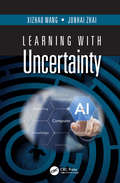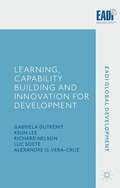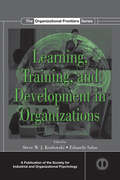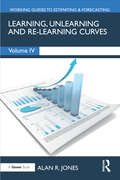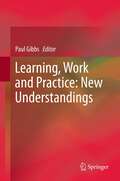- Table View
- List View
Learning with Uncertainty
by Xizhao Wang Junhai ZhaiLearning with uncertainty covers a broad range of scenarios in machine learning, this book mainly focuses on: (1) Decision tree learning with uncertainty, (2) Clustering under uncertainty environment, (3) Active learning based on uncertainty criterion, and (4) Ensemble learning in a framework of uncertainty. The book starts with the introduction to uncertainty including randomness, roughness, fuzziness and non-specificity and then comprehensively discusses a number of key issues in learning with uncertainty, such as uncertainty representation in learning, the influence of uncertainty on the performance of learning system, the heuristic design with uncertainty, etc. <P><P>Most contents of the book are our research results in recent decades. The purpose of this book is to help the readers to understand the impact of uncertainty on learning processes. It comes with many examples to facilitate understanding. The book can be used as reference book or textbook for researcher fellows, senior undergraduates and postgraduates majored in computer science and technology, applied mathematics, automation, electrical engineering, etc.
Learning, Capability Building and Innovation
by Keun Lee Richard Nelson Gabriela Dutr�nit Alexandre O. Vera-Cruz Luc SoeteToday, a large number of scholars studying development understand this process as involving learning and capability building. Capability building is an active, not a passive, process. It requires a purposeful effort from the learner's side, with support and commitment on allocation of time and resources toward learning activities. This process implies the possibility of failure as well as success, as we also learn from failures. A global cast of academics and policy makers examines economic development as a process of learning and technological accumulation, showing how economic development is a process involving creative destruction. While markets and market competition play major roles in structuring the development process, non-market institutions and government policies matter.
Learning, Environment and Sustainable Development: A History of Ideas
by William Scott Paul VareThis book is an introduction to the long history of human learning, the environment and sustainable development – about our struggles with the natural world: first for survival, then for dominance, currently for self-preservation, and in future perhaps, even for long-term, mutually beneficial co-existence. It charts the long arc of human–environment relationships through the specific lens of human learning, putting on record many of the people, ideas and events that have contributed, often unwittingly, to the global movement for sustainable development. Human learning has always had a focus on the environment. It’s something we’ve been engaged in ever since we began interacting with our surroundings and thinking about the impacts, outcomes and consequences of our actions and interactions. This unique story told by the authors is episodic rather than a connected, linear account; it probes, questions and re-examines familiar issues from novel perspectives, and looks ahead. The book is of particular interest to those studying (and teaching) courses with a focus on socio-economic and environmental sustainability, and non-governmental organisations whose work brings them face-to-face with the general public and social enterprises.
Learning, Leading, and the Best-Loved Self in Teaching and Teacher Education (Palgrave Studies on Leadership and Learning in Teacher Education)
by Cheryl J. Craig Gayle A. Curtis Denise M. McDonaldThis book explores the concept of the "best-loved self" in teaching and teacher education, asserting that the best-loved self is foundational to the development of teacher identity, growth in context, and learning in community. Drawing on the work of Joseph Schwab, who was the first to name the "best-loved self," the editors and their contributors extend this knowledge further through the collaboration of their group of teacher educators, known as the Faculty Academy, who have been involved in examining teacher education for over two decades.
Learning, Training, and Development in Organizations (SIOP Organizational Frontiers Series)
by Steve W. J. KozlowskiThis scholarly book in SIOP’s Organizational Frontier series looks at research on enhancing knowledge acquisition and its application in organizations. It concentrates on training, design and delivery given the changing nature of work and organizations. Now that work is increasingly complex, there is greater emphasis on expertise and cognitive skills. Advances in technology such as computer simulations and web-based training are necessitating a more active role for the learner in the training process. In the broad context of the organization systems, this book promotes learning and development as a continuous lifelong endeavor.
Learning, Unlearning and Re-Learning Curves (Working Guides to Estimating & Forecasting #4)
by Alan R. JonesLearning, Unlearning and Re-learning Curves (Volume IV of the Working Guides to Estimating & Forecasting series) focuses in on Learning Curves, and the various tried and tested models of Wright, Crawford, DeJong, Towill-Bevis and others. It explores the differences and similarities between the various models and examines the key properties that Estimators and Forecasters can exploit. A discussion about Learning Curve Cost Drivers leads to the consideration of a little used but very powerful technique of Learning Curve modelling called Segmentation, which looks at an organisation’s complex learning curve as the product of multiple shallower learning curves. Perhaps the biggest benefit is that it simplifies the calculations in Microsoft Excel where there is a change in the rate of learning observed or expected. The same technique can be used to model and calibrate discontinuities in the learning process that result in setbacks and uplifts in time or cost. This technique is compared with other, better known techniques such as Anderlohr’s. Equivalent Unit Learning is another, relative new technique that can be used alongside traditional completed unit learning to give an early warning of changes in the rates of learning. Finally, a Learning Curve can be exploited to estimate the penalty of collaborative working across multiple partners. Supported by a wealth of figures and tables, this is a valuable resource for estimators, engineers, accountants, project risk specialists, as well as students of cost engineering.
Learning, Work and Practice: New Understandings
by Paul GibbsThis book's original contribution to a crowded literature on work and learning will attract strong international interest. Its focus on the philosophy of learning at work brings a fresh perspective on a topic normally viewed through psychological, anthropological and sociological eyes. It assembles a host of internationally recognized scholars who reflect on the various philosophies of work-based learning. Full of distinctive and original contributions that provide perceptive insights into the subject, the work will be a practical support to teachers, trainers and researchers at the same time as it gives readers a clear philosophical grounding in learning at work. It is, however, not simply a book about philosophy, but a gazetteer of approaches to education in work that will sustain and inspire those who provide, engage in, and support the learning of new knowledge and skills in the workplace. With adaptability to new employment opportunities so vital to existing workers, the authors stand behind continued provision of work-based learning in the face of tightening economic constraints.
Lease Accounting and Analysis
by David F. HawkinsDiscusses global accounting for leases by lessees and lessors with emphasis on U.S. lease accounting standards. A rewritten version of an earlier note.
Leases & Rental Agreements
by Janet Portman Marcia StewartEssential rental forms every landlord needs Looking for a quick way to create the key documents necessary for owning or managing rental property, including a legally valid lease or rental agreement? Leases & Rental Agreements provides the practical and legal information necessary you need. With this bestselling guide, you'll learn how to: prepare a rental agreement or lease tailor your documents to meet your needs make required disclosures to tenants comply with your state's laws on security deposits, privacy rules, discrimination, and more check tenant references and credit, and do a final inspection when a tenant moves out. The 12th edition provides updated 50-state information on security deposits, rent rules, access to rental property and more. All forms are downloadable from the Nolo website.
Leases & Rental Agreements
by Marcia StewartRent your property now with this quick and easy handbook. Looking for a quick way to create the key documents necessary for owning or managing rental property, including a legally valid lease or rental agreement? Leases & Rental Agreements provides the practical and legal information necessary to rent out your property in record time -- and without a pricey attorney. With this bestselling guide, you'll learn how to: prepare a rental agreement or lease tailor your documents to meet your needs make required disclosures comply with your state's laws on security deposits, privacy rules, discrimination and more check tenant references and credit do a final inspection when a tenant moves out step-by-step instructions to fill out the forms and more This edition provides updated 50-state legal charts on security deposits, rent rules, access to rental property and more, plus an expanded chart on your state's disclosure laws.
Leases & Rental Agreements (7th edition)
by Ralph Warner Janet Portman Marcia StewartThis excellent book should be required reading for all landlords and tenants. It is easy reading yet filled with important, accurate and profitable information.
Leases & Rental Agreements: Keep Your House or Walk Away With Money in Your Pocket
by Janet Portman Marcia StewartCreate a solid, binding lease that complies with your state laws If you rent out residential real estate, you need to create documents that are legally valid where your rental property is located. Every state’s rules are different when it comes to what landlords must include in their leases, and stationery store forms don’t tell you what you need to know. Not only does this book contain instructions on how to tailor your rental documents to your state’s laws, it also gives you customizable copies of key rental forms you need, including: a fixed-term lease a month-to-month rental agreement a rental application tenant reference and credit check forms move-in and move-out letters, and a property inspection checklist. The 13th edition is completely updated to reflect the latest state landlord-tenant laws—find out what your state requires regarding security deposits, entry to rental property, disclosures, termination notices, and much more. This new edition also covers topics relevant to today’s landlords, such as how to handle online transactions, how to make sure e-signatures are valid, and how to comply with laws protecting your tenants’ private information.
Leases and Rental Agreements (Tenth Edition)
by Ralph Warner Janet Portman Marcia StewartLooking for a quick way to create the key documents necessary for owning or managing rental property, including a legally valid lease or rental agreement? Leases & Rental Agreements provides the practical and legal information necessary you need. With this bestselling guide, you'll learn how to: - prepare a rental agreement or lease - tailor your documents to meet your needs - make required disclosures to tenants - comply with your state's laws on security deposits, privacy rules, discrimination and more - check tenant references and credit - do a final inspection when a tenant moves out This edition provides updated 50-state information on security deposits, rent rules, access to rental property and more, plus an expanded chart on state disclosure laws.
Leases for Lives: Life Contingent Contracts and the Emergence of Actuarial Science in Eighteenth-Century England
by David R. BellhouseMany historians of insurance have commented on the disconnect between the rise of English life insurance companies in the early eighteenth century and the mathematics behind the sound pricing of life insurance products that was developed at about the same time. Insurance and annuity promoters typically ignored this mathematical work. Bellhouse explores this issue, and shows that the early mathematical work was not motivated by insurance but instead by the fair valuation of life contingent contracts related to property. Even the work of the mathematician James Dodson in the creation of the Equitable Life Assurance Society, offering sound actuarially based premiums, did not change the industry in any significant way. The tipping point was a crisis in 1770 in which the philosopher and mathematician Richard Price, as well as other mathematicians, showed that a dozen or more recently formed annuity societies could not meet their financial obligations and were inviable.
Leasing Computers at Persistent Learning
by Devin ShanthikumarNewly public Persistent Learning is acquiring vital computer assets. They need to determine how the lease or purchase decision will impact their financial statements, and how the market will react given previously forecast earnings and competitor's accounting.
Leasing Decision at Magnet Beauty Products, Inc.
by Krishna G. Palepu George SerafeimA fast-growing retailer is facing two different leasing options for its stores. In choosing between the two options, management is considering the potential impact of the two options on the company's financial statements, in light of the proposed new accounting standard for leases.
Least Developed Countries and the WTO
by Helen HawthorneA norm of special treatment for LDCs, created by the UN, has spread to various international organisations including the WTO. Within the WTO evidence of the institutionalization of the norm can be found both in the agreements and legal documents and the way in which the LDCs have been treated by other states. Helen Hawthorne investigates how norms impact on negotiations in international organisations. She shows that few studies of international organisations focus on the role of the weaker states in the organization, the majority focus either on the major states or the emerging economies. By ignoring the role of the poorer, weaker states in the GATT/WTO we are ignoring the history of these states in the organisation and do not get a true picture of the organization, how it operates in relation to them and their impact on the organisation.
Leatherman: The Legend of Chuck Renslow
by Tracy Baim Owen KeehnenA prominent Chicago gay activist and entrepreneur is the subject of an in-depth biography, Leatherman: The Legend of Chuck Renslow, by journalists and authors Tracy Baim and Owen Keehnen. Living as an openly gay man in 1950s Chicago was no easy task. For Chuck Renslow, that was only his first of many bold moves. Just out of high school he began what was to become a six-decade empire, starting more than two dozen businesses in Chicago, as well as a few in other cities. He has owned bars, discos, photo studios, health clubs, bathhouses, gay magazines and newspapers, hotels, restaurants, and bookstores. Throughout it all he dealt with Mafia and police payoffs, anti-gay political policies, harassment from censors, and even controversy within the gay community. In the mid-1950s, after having a portrait and then cheesecake studio, Renslow began experimenting with beefcake photography and began Kris Studio. With his longtime lover, the artist Dom Orejudos aka Etienne and Stephen, at his side, Renslow created Kris Studio a leader in male physique photography, resulting in such magazines as Triumph, Mars and The Rawhide Male, producing thousands of erotic images as well as several films. In 1959 Renslow took over the Gold Coast Show Lounge and transformed it into one of the most lowdown libidinous gay leather bars in the world. With Etienne's murals adorning the walls, a leather/Western/uniform dress code for patrons, and a dark Pit that featured all sorts of goings-on, the Gold Coast set the standard for raunchy kink and gay sexual liberation. It was the birthplace of motorcycle clubs and sex groups, but above all a place for people to meet, connect, and explore themselves and their sexuality. The Gold Coast was also the birthplace of the first leather contest, which in the span of a few short years evolved beyond the bar's capacity and became International Mr. Leather in 1979. More than three decades later, it continues to be one of the world's most popular gay events. Renslow was also one of the pioneers in taking a bathhouse beyond merely the borders of a mere sex club. Man's Country became something truly unforgettable in the 1970s - a sex-and-entertainment complex with a variety of rooms, shops, and a Music Hall that attracted top names touring in the "K-Y circuit," from Sally Rand to Wayland Flowers to Rusty Warren and Charles Pierce. Renslow was a dynamic force in Chicago politics under mayors starting with Richard J. Daley, and he ran to be a delegate for Sen. Ted Kennedy's 1980 presidential run. He danced with another man at a 1977 inaugural ball for Jimmy Carter. Renslow helped protest against unfair policies, fought censorship and entrapment, and battled Anita Bryant. He even served as a field contact for the pioneering work at the Kinsey Institute, as well as performing sexual acts for Kinsey researchers. He knew entertainment celebrities from Marlene Dietrich to Rudolf Nureyev, from Divine to Grace Jones, and from Sylvester to Quentin Crisp. In their heyday Chuck Renslow's annual White Parties were celebrations beyond compare. When Chicago's gay community faced the loss of its newspaper, Renslow bailed out and ran GayLife. He also co-founded the Leather Archives & Museum (with Tony DeBlase). Through it all Renslow has also been Daddy of the Family, a unique created group of lovers, tricks, and friends who were bound by sex and oftentimes love and by a goal of providing comfort and support to one another.
Leave Me Alone and I'll Make You Rich: How the Bourgeois Deal Enriched the World
by Deirdre Nansen McCloskey Art CardenThe economist and historian Deirdre Nansen McCloskey has been best known recently for her Bourgeois Era trilogy, a vigorous defense, unrivaled in scope, of commercially tested betterment. Its massive volumes, The Bourgeois Virtues, Bourgeois Dignity, and Bourgeois Equality, solve Adam Smith’s puzzle of the nature and causes of the wealth of nations, and of the moral sentiments of modernity. The world got rich, she argues, not chiefly by material causes but by an idea and a sentiment, a new admiration for the middle class and its egalitarian liberalism. For readers looking for a distillation of McCloskey’s magisterial work, Leave Me Alone and I’ll Make You Rich is what you’ve been waiting for. In this lively volume, McCloskey and the economist and journalist Carden bring together the trilogy’s key ideas and its most provocative arguments. The rise of the west, and now the rest, is the story of the rise of ordinary people to a dignity and liberty inspiring them to have a go. The outcome was an explosion of innovation after 1800, and a rise of real income by an astounding 3,000 percent. The Great Enrichment, well beyond the conventional Industrial Revolution, did not, McCloskey and Carden show, come from the usual suspects, capital accumulation or class struggle. It came from the idea of economic liberty in Holland and the Anglosphere, then Sweden and Japan, then Italy and Israel and China and India, an idea that bids fair in the next few generations to raise up the wretched of the earth. The original shift to liberalism arose from 1517 to 1789 from theological and political revolutions in northwest Europe, upending ancient hierarchies. McCloskey and Carden contend further that liberalism and “innovism” made us better humans as well as richer ones. Not matter but ideas. Not corruption but improvement. Leave Me Alone and I’ll Make You Rich draws in entertaining fashion on history, economics, literature, philosophy, and popular culture, from growth theory to the Simpsons. It is the perfect introduction for a broad audience to McCloskey’s influential explanation of how we got rich. At a time when confidence in the economic system is under challenge, the book mounts an optimistic and persuasive defense of liberal innovism, and of the modern world it has wrought.
Leave No Doubt
by Mike Babcock Rick LarsenMike Babcock is the only hockey coach in the history of the game to lead teams to victory in the Stanley Cup, the World Championship, and the Olympic Games. Currently head coach for the Detroit Red Wings, he is arguably the best coach in the game today. In this book, against the dramatic backdrop of the Canadian men's gold medal victory in Vancouver, Babcock provides an inspiring roadmap for achieving goals and fulfilling dreams. This is not just a book about hockey but a book about life, rooted in Babcock's "Leave No Doubt" credo. Written by Babcock and his longtime friend Rick Larsen, the credo hung on Team Canada's dressing-room wall during their historic run to Olympic gold. It provides a compelling framework for excelling in life. Illuminated by revealing stories about overcoming doubt, "owning pressure," and making a difference, "Leave No Doubt" is based on a firm belief in everyday commitment and a step by step approach to being "better than good enough." The words originally written for Canada's Olympic gold medal hockey team - leave no doubt, every day counts, our determination will define us - inspire an approach to succeeding in life that is relevant to people of all interests and ambitions. Athlete or not, each of us will find valuable guidance in this succinct primer from one of the most respected leaders in sports.
Leave Something on the Table: and Other Surprising Lessons for Success in Business and in Life
by Frank BennackOne of the most innovative minds in business provides an equally original guide to getting ahead.Frank Bennack’s accomplishments in media and business are unrivaled. He was named chief executive of Hearst in 1979, and for nearly 30 years he helped solidify the company’s reputation as a leader in consumer media, overseeing the purchase of more than two dozen television stations and several major newspapers (Houston Chronicle), the launch of top-selling magazines (O, The Oprah Magazine), and a partnership with ABC, now the Walt Disney Company, to create the pioneering cable networks A&E, HISTORY, and Lifetime. One of his greatest achievements was when, in 1990, he negotiated a 20 percent stake in ESPN for $167 million. The sports network would be valued by market analysts at roughly $30 billion. He also played a key role in Hearst’s march toward diversification, with acquisitions of business media assets including global ratings agency Fitch Group. In Leave Something on the Table, Bennack takes readers behind the scenes of these high-stakes moves and offers practical tips for excelling in the corporate world and beyond. He tells stories from his Texas childhood—a first job at 8, his own television show at 17—that foretold why he would become a CEO at 46. And he shares his encounters with US presidents, reflects on his longtime commitment to philanthropy, and describes his and his colleagues’ unwavering quest to build the visionary Hearst Tower. This is a heartfelt handbook for how to advance not only as a professional but as a person. As Bennack writes, “It’s not currently fashionable to make the case for the high road. It looks longer, and old-fashioned, and it’s easy to conclude that while you’re climbing the ladder, burdened by your values, others are reaching the top faster. But if the stories in these pages suggest a broader truth, it’s exactly the opposite: The high road is quicker, with a better view along the way, and more satisfaction at the summit.”
Leave Your Mark: Land Your Dream Job. Kill It In Your Career. Rock Social Media
by Aliza Licht"If you want the job of your dreams, read this book." - Stacy London, TV personality and style expertLeave Your Mark isn't an advice book -- it's a mentorship in 288 pages.Aliza Licht- global fashion communications executive, fashion's favorite 'PR girl,' and former Twitter phenomenon - is here to tell her story, complete with The Devil Wears Prada-like moments and insider secrets.Drawing invaluable lessons from her own experience, Licht shares advice, inspiration, and a healthy dose of real talk. She delivers personal and professional guidance for people just starting their careers and for people who are well on their way.With a particular emphasis on building your personal brand (something she knows a thing or two about), Aliza is your sassy and knowledgeable guide to the contemporary working world, where personal and professional lines are blurred and the most important thing you can have is a strong sense of self.
Leave Your Mark: Land your dream job. Kill it in your career. Rock social media.
by Aliza LichtLEAVE YOUR MARK isn't an advice book -- it's a mentorship in 288 pages. Aliza Licht -- global fashion communications executive, AKA fashion's favorite 'PR girl' and Twitter phenomenon -- is here to tell her story, complete with The Devil Wears Prada-like moments and insider secrets.Drawing invaluable lessons from her experience, Licht shares advice, inspiration, and a healthy dose of real talk in LEAVE YOUR MARK. She delivers personal and professional guidance for people just starting their careers and for people who are well on their way. With a particular emphasis on communicating and building your personal brand, something she knows a thing or two about, Aliza is your sassy, knowledgeable guide to the contemporary working world, where personal and professional lines are blurred and the most important thing you can have is a strong sense of self.
Leave Your Phone at the Door: The Joy of OFFLINE
by Howard LewisLeave Your Phone at the Door acts as a timely and topical reminder to look beyond our phones and enjoy the physical benefits of community, randomness and serendipity.Real life happens beyond your phone screen. Leave Your Phone at the Door embraces the OFFLINE philosophy, which is a celebration of the much underrated virtues of randomness and serendipity. Whether sharing stories of unexpected encounters, alarming behavioral trends or the joys of quiet and contemplation, Howard Lewis encourages us to adopt an open mind and a generosity of spirit whenever we are confronted by the unfamiliar or surprising or different. We all have an innate desire to communicate but our constant reliance today upon personal technology is stripping our sensibilities bare. But rather than focusing upon the limitations of social media and phones, Lewis is far more animated by the mindful reframing of our place in the world. He offers his insights on the importance of relating to people in person and advice on developing social skills and habits that enrich our lives. What began as an informal gathering with friends led to the launch of the OFFLINE dinner, which he has hosted for over fifteen years in London. Guests are drawn from all walks of life and invited to engage with one another without the distraction of their phones. OFFLINE is designed to be the antithesis of everything online but also recognizes that veering off road and then back on it is both valuable and necessary. It aims to challenge and provoke, question and answer, stimulate and amuse, nurture and nourish in a delightful and congenial setting. This book is an embodiment of that ethos. Leave Your Phone at the Door acts as a timely and topical reminder to look beyond our phones and enjoy the physical benefits of community, randomness and serendipity. Who knows where it may take you and whom you might meet?!
Leave the Office Earlier: The Productivity Pro Shows You How to Do More in Less Time...and Feel Great About It
by Laura StackLong hours. Juggling family and work. Deadlines. High stress levels. Today’s professionals are feeling more overworked and overwhelmed than ever before. Yet you CAN get more done than you ever thought possible—and still get home to your real life sooner. Laura Stack, “The Productivity Pro,”® shows you how.Leave the Office Earlier explores the ten key factors that improve results, lower stress, and save time in today’s workplace. Fun, interactive quizzes speed you to exactly the advice and techniques you need the most. You can tailor this information-loaded book to your own needs by focusing on your problem areas—such as time-wasters, distractions, email overload, or poor organization—and by following the easy-to-implement solutions. With Laura Stack’s help, you’ll work more efficiently and be more productive in every area of your life, so that you can really live according to your priorities. Don’t just work faster. Work better, reduce stress, and leave the office earlier!www.broadwaybooks.com
